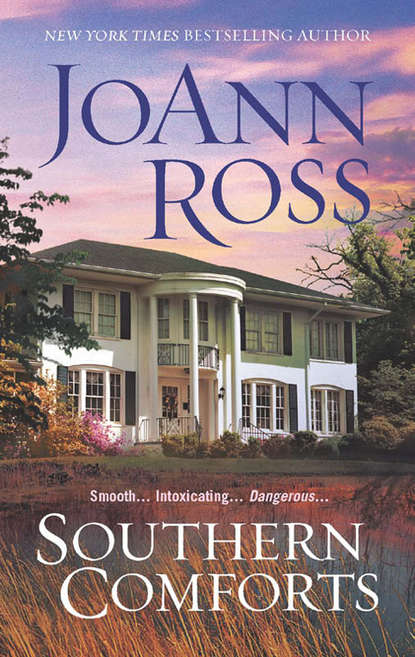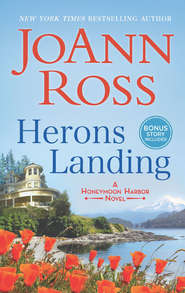По всем вопросам обращайтесь на: info@litportal.ru
(©) 2003-2025.
✖
Southern Comforts
Автор
Год написания книги
2018
Настройки чтения
Размер шрифта
Высота строк
Поля
“You really are a wonder,” she said with honest appreciation. “If things go well, I may actually manage to get another chapter done on my novel.” She’d been slogging away at the suspense story centered around the murder of a thoroughly unlikable movie star for the past two years; trying to squeeze time in between her hectic work schedule and her on-again, off-again, and now on again relationship with Nelson.
“That’s what I was thinking,” Heather said with another of those smiles that was as smooth as her sleek blond hair.
Although the job of editorial assistant paid starvation wages, Heather always managed to look as if she’d stepped right out of the pages of Town and Country magazine. Once, after Liz Smith had shown up at the office for a lunch date with Chelsea, the gossip columnist had declared that the new editorial assistant was Vanity Fair’s answer to Princess Di.
The difference, Chelsea had considered at the time, was that Heather Van Pelt possessed far more self-confidence than the most celebrated member of Britain’s royal family. She was also more ambitious. Chelsea knew Heather wanted her job. Since she didn’t have any intention of giving it up anytime soon, such single-minded zeal didn’t disturb her. Especially when it resulted in upgraded plane tickets and hotel reservations.
Raintree
Amidst the Camelot environs of her lushly wooded landscape, Roxanne Scarbrough sat in the library of her Tudor-style home leafing through the mail her assistant Dorothy Landis had left on her Louis Quatorze desk. On the corner of the desk, an electric fan was ineffectually attempting to stir the moisture-laden air.
Roxanne was not happy. Trust the air conditioner to choose today of all days to give out! The temperature outside was unseasonably warm for April. Although it was not yet noon, a thick, wet heat had seeped into the house through the window screens, permeating everything, making her sweat.
No. Ladies never sweat, she reminded herself with a brisk mental shake. As moisture beaded on her forehead and between the cleft of her breasts, she remembered telling Oprah about her southern grandmother’s stern edict that horses sweat, men perspired and ladies glistened.
Of course, beloved old Maw Maw, with her infinite wealth of southern aphorisms, was, like so much of Roxanne’s outwardly perfect life, a fictional invention. Still, the stories she’d spun during that afternoon taping had added a charming southern warmth to the interview.
The bundled-up Yankee audience, still shivering from the Chicago blizzard raging outside Harpo Studios, had, as always, eaten it up, and her clipping service subsequently reported that the “glisten” quote had appeared in sixty-five papers around the country over the next week.
It wasn’t always easy being Roxanne Scarbrough. But, she considered with a self-satisfied smile, no one did it better.
The breeze from the fan stirred the fragrance of potpourri she’d created from pink freesia and Lady Banks roses growing in the formal gardens.
When she’d first planted the garden, several members of the Raintree garden club had warned her against including the old-fashioned rosebushes. Local legend prevailed that when a Lady Banks got old enough to shade your grave, you’d die. Not the least bit superstitious, Roxanne had ignored the caution. But knowing a good story when she heard one, she’d included the myth in her latest lifestyle book, Strolling Through Grandmother’s Southern Garden.
She skimmed a fax she’d received this morning from her agent regarding Chelsea Cassidy. Although at first glance, she’d considered the writer to be a definite lightweight, the deft way she’d handled her interview and the Vanity Fair article Roxanne had read on the flight back from New York proved that appearances were definitely deceiving.
Roxanne had no concerns about the writer rejecting the proposal her agent was going to make. People did not say no to Roxanne Scarbrough.
Especially men, she considered with a slow smile ripe with feminine intent as she glanced over at the mantel clock. She should have left a half hour ago for her luncheon engagement. Not that she was in any particular hurry. It was, after all, a lady’s prerogative to keep a gentleman waiting.
However, in this case, it would be a blessed relief to leave the house. The stifling humidity clogged Roxanne’s lungs, making her feel as if she were trying to breathe underwater. Her dress—a silk wash of watercolor flowers with a dangerously plunging neckline, selected specifically for today’s lunch with Cash Beaudine—already seemed too hot and heavy against her heated skin.
Deciding to open one more piece of mail, she picked up a sterling silver letter opener in the Francis I pattern she claimed she’d inherited from her unfortunately deceased mother, and slit open a cheap dimestore envelope marked Personal that had been forwarded from the staff of Good Morning America. Obviously another piece of fan mail. Considering the inferior stationery, this was a person in dire need of lifestyle training.
The paper was badly ink stained, as if the letter had been written with one of those horrid plastic ballpoint pens one saw everywhere these days. As her eyes skimmed down the wrinkled page, Roxanne’s heart clenched. The scrawled handwriting was all too familiar.
“Dear Cora Mae...”
She pressed a beringed hand against the front of her silk dress and wondered if she could be having a heart attack. Black spots danced like whirling demons in front of her eyes.
Belying the fictitious Maw Maw’s now famous axiom, it was, indeed, sweat that puddled beneath Roxanne’s armpits and slithered wetly down her sides.
* * *
Cash was suffocating. The restaurant Roxanne Scarbrough had chosen for their luncheon meeting was one of those precious southern tearooms that had sprung up in plantation mansions all over the state, catering to a female clientele who preferred to pretend that William Tecumseh Sherman—or, as he was known around these parts, “that low-down Yankee pyromaniac”—had never set a booted foot in Confederate Georgia. Decorated in shades of peach and mint green, it boasted translucent china, sterling cutlery, glittering crystal, hanging plants and lace-covered windows. He’d been at the tearoom for nearly an hour. During which time Roxanne had pulled out all the stops in her attempt to convince him that he was the only man in Georgia, indeed, on the planet, capable of restoring her antebellum plantation house.
Located just outside Raintree, on the road to Savannah, if the woman could be believed, the mansion was a combination of Twelve Oaks and Tara, with a little Xanadu’s pleasure palace thrown in for good measure. To demonstrate she’d done her homework, she’d also brought along an attaché case of engineering reports, proclaiming the home to be structurally sound.
Roxanne tried tempting him with fame, assuring him that the project would end up featured in yet another of her bestselling books.
“You’ve no idea how many people buy these books,” she stressed over salads of spinach, bay shrimp, watercress and artichoke hearts. There was not a single offering of red meat on the menu. “People with quality who need my guidance when it comes to creating a stylish ambiance.”
She shared a conspiratorial smile. “And just think, when they read that you’re the man I’ve selected to create my dream home, why, your phone will be ringing off the hook.”
There’d been a time, not so long ago, when Cash might have found the idea enticing. But no longer. Not after his years in San Francisco.
“As attractive an idea as that might be,” he said mildly, “I currently have about as much work as I can handle.” His own smile did not reach his eyes. “Some people, it appears, have heard of me without the media hype.”
“Well, of course they have,” Roxanne said quickly. Switching gears with an alacrity that Cash found impressive, she appealed again to his ego. “But if you were to work for me—”
“With,” he interjected.
She arched a perfectly shaped eyebrow. “Excuse me?”
“If I were to agree to do the job, which I’m not saying I am,” he drawled, “I’d be working with you, not for you. It would be a joint project, based on your vision, but I’d insist on input on all decisions.”
“Oh.” Cash was not all that surprised by the way she managed to frown without causing a single line in her forehead or her lips. Southern women had such frowns down to a science. “I’m not accustomed to collaborating.”
“I can understand that.” He braced both elbows on the table and eyed her over his linked fingers. “However, remodeling a house is not exactly the same as baking petit fours or creating gilded mistletoe Christmas wreaths. It’s a major construction project, often more difficult than the original work. It also requires the art of compromise between architect and home owner.”
“Compromise.” Her sigh caused her breasts to rise and fall beneath the flowered silk dress. Cash watched her mulling the idea over and decided it was not something she was accustomed to doing. “I could live with that,” she decided after a long pause. “So long as I had the last word.”
“Unless it involved structural integrity.” The words were no sooner out of his mouth than he realized she’d obviously take them as encouragement. “Then the decision would be mine.”
“Agreed.” She sat back in the velvet chair and crossed her legs with a satisfied swish of silk on silk. “So, when would you like to look at the house?”
“I haven’t said I’d take the job,” Cash reminded her.
“If you’d just look at Belle Terre, you might be more amenable. It’s horribly run down at the moment. I swear, it looks as if Sherman’s entire army had just finished sacking it. But I’m sure an artistic man such as yourself—” her voice lowered, thickening to molasses
“—will be able to see its true potential.”
She was definitely not a lady accustomed to hearing the word no. Cash had known women a lot like Roxanne Scarbrough in San Francisco, but most of them had been society wives, married to wealthy, usually much older men. Men more interested in making money than paying attention to their blond and bored trophy wives.
Which was where he’d come in. The same women who’d married for money and ended up being corporate widows, were often desperate for male companionship. Being male and available, Cash had done his best to oblige them.
Until one night when he’d been forced to climb out the bedroom window of a Pacific Heights mansion because his current lover’s stockbroker husband had arrived home early.
Shortly after that, realizing he was in danger of becoming a cliché, he’d resigned his partnership at the Montgomery Street firm and returned home to that very same place he’d worked like hell to escape.
Growing up on the wrong side of the tracks, he’d found Raintree creatively and personally stifling. Every conversation began with the opening line, “Who are your people?”
The answer to that had routinely kept him barred from country club dances and fraternity mixers. In a part of the country where family roots tended to predate the Revolution, having a sharecropper for a daddy and a mama who’d come from a Blue Ridge family known primarily for the high quality of their bootleg whiskey, kept him out of the social register.
His daddy had died when Cash was thirteen. Although his mother had done her best to look after them, money had become even harder to come by, which is how he’d ended up doing odd jobs at Fancy’s whorehouse on the outskirts of town.
It was there Cash had received a first-class education on how to sexually please a woman. Such insight had allowed him to coax more than his share of fascinated, daring debs into the backseat of his black Trans Am. The same belles whose fathers would have bolted the door and gotten out the shotgun if they knew a renegade like him was sniffing around their precious baby daughters.











